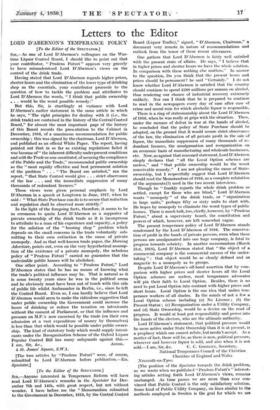Letters to the Editor LORD D'ABERNON'S TEMPERANCE POLICY
[To the Editor of the SrEcrAroit.1 Sntr.—As one of Lord D'Abernon's colleagues on the War- time Liquor Control Board, I should like to point out that your contributor, " Prudens Futuri" appears very gravely to have misunderstood Lord D'Abernon's Niews on the control of the drink trade.
Having stated that Lord D'Abernon regards higher prices, shorter hours and the elimination of the lower type of drinking shop as the essentials, your contributor proceeds to the question of how to tackle the problem and attributes to Lord D'Abernon the words, "I think that public ownership
. . would be the worst possible remedy."
But this, Sir, is startlingly at variance with Lord D'Abernon's earlier statement in the same article in which he says, "The right principles for dealing with it (i.e., the drink trade) are contained in the history of the Central Control Board," for almost the most important page of the history of this Board records the presentation to the Cabinet in December, 1916, of a unanimous recommendation for public ownership; this was signed by the chairman, Lord D'Abernon, and published as an official White Paper. The report, having pointed out that in so far as existing regulations failed it was because of "the inherent difficulty under present conditions and with the Trade as now constituted, of securing the compliance of the Public and the Trade," recommended public ownership as the "most rapidly effective and best permanent solution of the problem" . . . "The Board are satisfied," ran the report, "that State Control would give. . . strict observance of the law . . . and the immediate suppression of many thousands of redundant licences."
These views were given personal emphasis by Lord D'Abernon in a speech at Longtown in June, 1917, when he said : "What State Purchase can do is to secure that reduction and regulation shall be observed more strictly."
In the light of the foregoing facts, therefore, it seems to be as erroneous to quote Lord D'Abernon as a supporter of private ownership of the drink trade as it is incongruous to attribute to a man of his experience and capacity, a policy for the solution of the "boozing shop" problem which depends on the small concerns in the trade voluntarily sub- mitting to their own extinction in the cause of private monopoly. And as that well-known trade paper, the Morning Advertiser, points out, even on the very hypothetical assump- tion of the existence of a private monopoly, the nebulous policy of "Prudens Futuri" carried no guarantee that the undesirable public houses will be abolished.
One other point. According to "Prudens Futuri," Lord D'Abernon states that he has no means of knowing what the trade's political influence may be. That is natural as it is some twenty years since he was in the political arena and he obviously must have been out of touch with this side of public life whilst Ambassador in Berlin, i.e., since he left the Control Board. Even so, I can hardly believe that Lord D'Abernon would seem to make the ridiculous suggestion that under public ownership the Government could increase the hours of drinking or reduce the taxation on intoxicants without the consent of Parliament, or that the influence and pressure on M.P.'s now exercised by the trade (on their own admission at a vast expenditure of money by themselves) is less than that which would be possible under public owner- 'ship. The kind of statutory body which would supply intoxi- cants under the Reorganization Scheme of the Oxford Liquor Popular Control Bill has many safeguards against this.— • 4 St. James' Square, S.W.1.
[The two articles by "Prudens Futuri" were, of course, submitted to Lord D'Abernon before publication.—Er4 Spectator.]










































 Previous page
Previous page